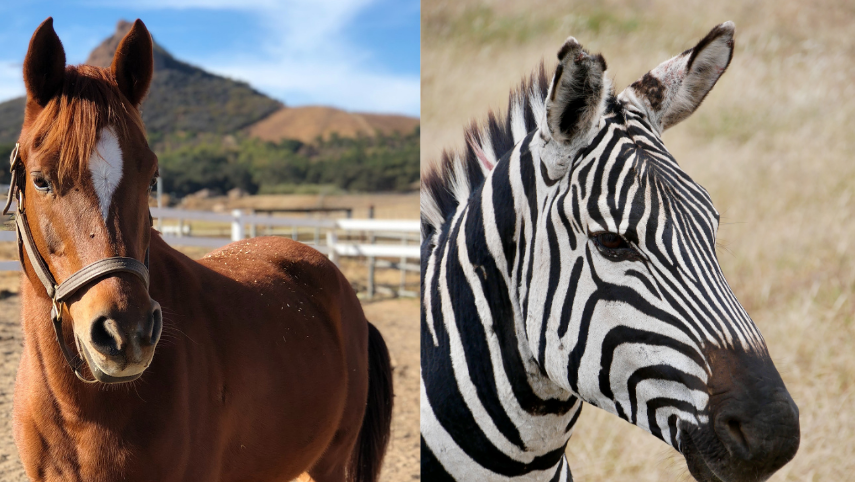Check out our entire series explaining the science involved in the coronavirus pandemic. Sign up to receive our coronavirus update each week.
Which of these explanations strikes you as more plausible?
A. I didn’t show up for Zoom class because I overslept.
B. I didn’t show up for Zoom class because I was kidnapped by aliens.
Which of these statements seems more likely to be true?
A. I didn’t eat my broccoli because I knew it had been poisoned.
B. I didn’t eat my broccoli because I don’t like it.
Finally, if you hear hoofbeats behind you, what is more probable?
A. A horse is trotting past.
B. A zebra is trotting past.
In each of these cases, one of the explanations is vastly more likely to be true than the other. While the alternatives are not utterly impossible, it would be foolhardy to accept them without a great deal of additional evidence. Your best bet would be to choose the more likely explanation, unless, for example, credible evidence emerged of a zebra-riding serial broccoli poisoner from outer space active in your neighborhood.
Implausible scenarios arise in science from time to time. One of the defining features of science is that it can’t ever claim to have proven something. The best it can do is lay out the evidence that supports a particular conclusion. The more vast the amount and quality of the evidence, the less likely the conclusion is to be incorrect. Rejecting a well-supported conclusion therefore requires an at least equal amount of high-quality evidence. Occasionally enough evidence is found to overturn extremely widely accepted ideas. The recognition that the Earth’s surface is made up of moving plates—plate tectonics—is one such case. Another is the relatively recent discovery that most stomach ulcers are caused not by stress but by a bacterial species called Helicobacter pylori. Scientists who make this kind of paradigm-busting discovery are justly praised, often after years of laboring in obscurity and enduring severe criticism or even ridicule.
The fact that this happens from time to time is a hoary pretext for making wild claims that run counter to well-supported scientific theories. Sure, there are thousands of scientists working across a range of disciplines and over decades whose work all points to anthropogenic climate change. But what if this one guy shows that this one place is getting colder? Doesn’t that call all the previous work into question? Sure, his colleagues don’t take him seriously. But they laughed at Columbus, they laughed at Fulton, they laughed at the Wright brothers. (“But,” to continue the quote from Carl Sagan, “they also laughed at Bozo the Clown.”)
I raise these considerations because we are currently faced with a similarly poorly supported but highly dramatic conclusion about the novel coronavirus SARS-CoV-2: that it was created in a laboratory. In particular, the claim is that a Chinese military laboratory engineered more than 3,000 individual mutations in a naturally occurring coronavirus strain in such a way as to intentionally produce a strain that would be highly transmissible and virulent in humans.
The motives of the lead author of this recent paper are somewhat suspect and the research was funded by an anti-mainland China activist group. Furthermore, the paper was posted on a preprint server, which means that it has not been peer-reviewed. Those facts, while decidedly suspicious, are not good enough reasons to reject the hypothesis out of hand. Who the author is, and where the funding came from, and the lack of peer review, are definitely worth considering, but they are not, in and of themselves, evidence that the science is wrong.
What dooms this particular paper is the weakness of the evidence it provides, much of it interpreted incorrectly, backed by inadequate or untrustworthy citations, or dependent on accusations of censorship, conflicts of interest, or other bad faith behavior on the part of the rest of the scientific community.
Had the paper been submitted for peer review, its weaknesses would quickly have been flagged. Indeed, researchers at the Johns Hopkins University Center for Health Security published a detailed review within days that would certainly have resulted in the paper having been rejected by any reputable journal. The review is rather heavy going for the casual reader, but it systematically dismantles all of the key claims of the paper. The review’s objections fall into two main categories: first, that not enough is known to engineer a coronavirus in this way; and second, that even if it were, the techniques suggested in the paper would not work. Furthermore, accepting the paper’s claims also means rejecting the considerable body of reputable research that suggests a natural origin of the virus. As you’ll see if you scan the review, the reviewers were at pains to refute the paper point by point.
Having been at the receiving end of plenty of detailed reviews of my own scientific research papers, I am well aware that responding to reviews can be difficult and unpleasant. I remember many instances where I disagreed heartily with some of the reviewers’ criticisms. But I had to respond to those criticisms and questions with more convincing explanations or more data, or my work would not be published. That’s how science works today. And it makes the results better. My papers were stronger after they were revised in response to the reviews.
There are plenty of people who are highly motivated to believe that this global catastrophe cannot possibly have happened naturally. They will no doubt reject criticisms of this latest paper as motivated by bias, prejudice, or censorship of unconventional ideas. But that is not how science works—that is how conspiracy thinking works. Extraordinary claims require extraordinary evidence, and this paper does not make the grade.


